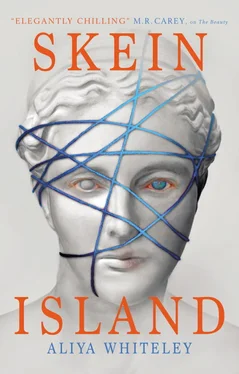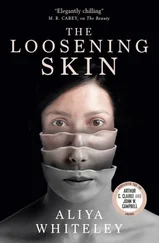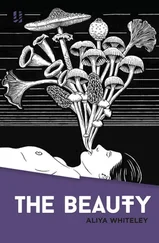If I had my way I suppose David would not be here, and then Rebecca would have thought that strange, no doubt. So perhaps it is as well that he talked me into letting him drive. The fact that he is willing to stand a short distance away from me today is a step forward. Since he rescued me from the basement he has not left me. He loves me, and I love him, of that I have no doubt. That has never been in question. But he is no longer just my husband, and of that I have no doubt either. Touching the statue – touching Moira – has changed him.
‘You’re still thinking about it, aren’t you?’ says Rebecca. While I watched our husbands, she was watching me. I feel ashamed of whatever might have just passed across my face. But I’m glad Rebecca has raised this topic; I realise I have something I want to say. ‘Thinking of Moira, yes. I’m having the house rebuilt. The basement will be excavated, if possible. If she’s down there, I’ll find her.’ Settling my mother’s estate is ongoing, but everything will eventually pass to me; the solicitors who held her Last Will and Testament have made that clear. The island will become my property.
I can’t get my head around that, but I’m certain that the house must be restored.
‘Are you thinking she’s still down there?’ Rebecca says, in that voice she uses – the patient tone of a therapist to those lowly individuals who don’t understand their own motivations. I wonder how her husband stands her. She must dissect every meal, every word, every sexual encounter they share.
‘Are you asking me if I think stone statues can move?’ I say, calling her bluff. I keep my eyes on David, wondering if he will look at me. But he’s talking, arms moving, making compact gestures as if describing an object. If he was the kind of man who cared about cars, I would say he was having that sort of conversation: how fast, miles per gallon. But he really never seems to care about such things. Maybe Rebecca’s husband does. I have to search my memory for his name; we were introduced before the funeral, briefly. It finally comes to me. I say to Rebecca, ‘Does Hamish like cars?’
‘What?’ she says. ‘No. Try to concentrate. This is important.’
‘At least we can agree on that.’
David and Hamish are smiling at each other, both talking, mimicking each other’s movements. They are in complete agreement about something. Around them, others are having the stiffer conversations that suit funerals better. If Kay were here she would have wanted to drive a motorbike through the living room and upset the carefully laid plates of garlic bread and sausage rolls, spilling them over the floor.
Kay’s mother is circulating through the crowd. She’s a tall woman with good posture, and she wears her white hair in an angular bob that looks fresh and glossy. She’s holding a silver tray upon which cluster flutes of white wine. Every time she stops at a group, the mourners draw together. She nods and smiles at them, and they respond in kind, but nobody takes a flute. As she crosses my field of vision I see annoyance flash across her face – Will nobody take a bloody drink? She is thinking. This tray is getting heavy . Why doesn’t she set it down and forget about it? Walk out of here, return later when everyone has left her house? Somebody would probably even do the tidying up and the dishes, out of guilt.
But mothers don’t leave, do they? Not even after death. Not the good ones.
‘I wish you were able to talk about this,’ says Rebecca. ‘Because—Because I really need to talk about it too. Hamish tries to understand but he’s…’
‘A man,’ I finish for her, and I know she hates it, the thought of this unbridgeable divide between man and woman that Vanessa has placed in our heads. But she doesn’t contradict me.
‘Since it happened he seems dead set on protecting me. Perhaps it was the thought of losing me. Everything we do now, every time I attempt to get up, he’s there, wanting to be my crutch.’
‘That’s pretty normal, surely?’
‘Of course,’ she says. ‘But before, if he was having protective impulses, we could talk about it. He’d be happy to admit it, to see that it was irrational. Now we can’t even have a conversation. Whenever I raise it he doesn’t listen. It’s like I’m of the utmost importance in his life, and at the same time, totally irrelevant.’
Rebecca has a way with words. I recognise this feeling, this marginalisation. I feel it every time David looks at me.
It would be so good to tell Rebecca my thoughts and fears about this. But I know what she wants is to cast me back into the role of patient so that she can make herself feel better. So instead I say, ‘The preliminary reports on the house show the foundations were weakened by a natural spring that runs under the island.’
‘Really?’
‘Vanessa was tapping it. In the basement. Diverting the flow of the water and collecting it. Barrels of it. Don’t you remember the piping? It wound around Moira.’
‘The statue,’ Rebecca corrects me. ‘I don’t remember that. What for?’
‘I don’t know yet.’
‘A natural spring,’ she muses. ‘One pound fifty for a small bottle of Malvern water nowadays. She was sitting on top of a gold mine and died because of it. An expensive way to go.’
Vanessa filled those barrels for a reason. I wonder to whom she sold them, and what purpose they serve. It’s been intimated to me that I will soon become a very rich woman. Is it all left over from Amelia’s enormous fortune? Or had Vanessa found another way to add to the island’s wealth? Financial records – those not destroyed in the collapse – will eventually come to me, and then I will get some answers.
‘So what did you see?’ I find myself asking Rebecca, before I can stop myself. This is the conversation I didn’t want to have. ‘What did you see, down there? If you didn’t see the piping, or the barrels, and you didn’t see Moira?’
‘I knew it,’ she says. ‘You still believe it. That parlour trick Vanessa pulled.’
‘Forget what I believe. What do you believe?’
‘Your mother had real problems. I’d maybe characterise it as Stockholm Syndrome. She met a rich, brilliant, troubled woman who had lived through wars, seen terrible things, and that woman bound your mother to her, with lies. With stories. Then she died, and left your mother alone, and she wanted you back. To continue those stories. Keep them alive. So she set that whole thing up to manipulate you. She wanted you to stay there, on that island, with her. If you’re not careful, she’ll get her way. You’ll end up back there forever. Maybe not physically, but mentally.’
‘She never asked me to stay.’
‘She was getting to it!’
‘It took her seventeen years to get that far.’
‘People spend their whole lives preparing for certain moments, Marianne.’ Rebecca scratches her knee just above the cast. ‘Only those moments count, for them. The stuff that happens every day, that’s just marking time until the big scene. The reveal. We all live that way sometimes. Working towards a wedding day, the birth of a child. We imagine it, and prepare for it, even if we’re not engaged or pregnant. Perhaps it’s a female thing. We just don’t live in the present, do we?’
I think perhaps she’s right. But if Moira was an illusion, clever trickery with lights and effects, then what was my mother hoping to make me think?
‘I never should have gone to that stupid island,’ says Rebecca. ‘I knew it wasn’t going to teach me anything useful about myself. All I’ve learned is a phobia of damp basements.’
‘Here’s hoping that’s a life lesson that stands you in good stead.’
‘Marianne, I come from Yorkshire. All the basements are damp. I can’t even make it down the stairs to grab a bottle of red wine from my cellar. Now that’s an issue.’
Читать дальше












